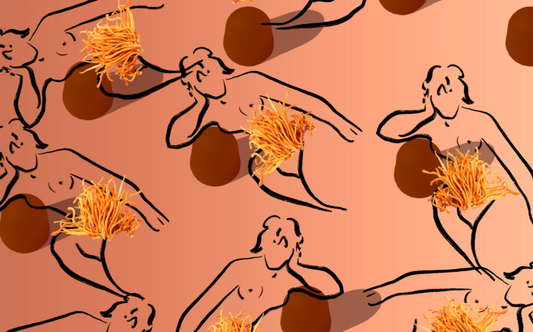Perimenopause, the transitional phase leading up to menopause, often brings an array of challenging symptoms, including sleep disturbances, night sweats, memory problems, and mood swings. We’ve incorporated Lion's Mane (Hericium erinaceus) into So Mush Support, out ten-functional mushroom gummy, due to its potential to alleviate some of these symptoms. Let's delve into the scientific evidence behind Lion’s Mane and how it can support women during perimenopause.
Cognitive Function Support
One area where Lion's Mane shows promise is in enhancing cognitive function. A study published in Biomedical Research in 2010 found that older adults with mild cognitive impairment who consumed Lion's Mane extract for 16 weeks showed significant improvements in cognitive performance compared to those who received a placebo. This suggests that Lion’s Mane may help address the memory and concentration issues that often accompany perimenopause.
Mood Stabilization and Mental Health
Perimenopause can bring about mood swings, anxiety, and depression. A 2010 pilot study in Biomedical Research investigated the effects of Lion's Mane on menopausal symptoms and mental health in women. After four weeks of supplementation, participants reported reduced anxiety and depression. These findings suggest that Lion's Mane could help stabilize mood and improve mental health during this transitional phase.
Neuroprotective Properties
Lion's Mane contains bioactive compounds such as hericenones and erinacines, which have been shown to stimulate the production of nerve growth factor (NGF). NGF is crucial for the health and growth of neurons, which supports better memory and cognitive function. This neuroprotective property is particularly beneficial for women experiencing cognitive changes during perimenopause.
Anti-inflammatory and Antioxidant Effects
Inflammation and oxidative stress can be exacerbated during perimenopause. Lion's Mane has demonstrated significant anti-inflammatory and antioxidant effects in various studies. For example, research published in the International Journal of Biological Macromolecules in 2015 showed that Lion's Mane polysaccharides could reduce oxidative stress and inflammatory responses in mice. These properties may help mitigate physical symptoms like night sweats and fatigue.
While the specific studies directly linking Lion’s Mane to menopause relief are limited, there are a number of relevant studies and evidence that support the mushroom’s potential benefits related to symptoms experienced during menopause, such as cognitive function, mood stabilization, and sleep quality. Here are some of the key areas of research:
Cognitive Function:
- A study published in Biomedical Research (2010) found that Lion’s Mane may enhance cognitive function in older adults. The study involved participants aged 50 to 80 years who experienced mild cognitive impairment. Participants who consumed Lion's Mane extract for 16 weeks showed significant improvements in cognitive function compared to the placebo group.
- Reference: Mori, K., Inatomi, S., Ouchi, K., Azumi, Y., & Tuchida, T. (2009). Improving effects of the mushroom Yamabushitake (Hericium erinaceus) on mild cognitive impairment: a double-blind placebo-controlled clinical trial. Phytotherapy Research, 23(3), 367-372.
Mood and Depression:
- A pilot study published in Biomedical Research (2010) examined the effects of Lion's Mane on menopausal symptoms and overall mental health in women. The study found that Lion's Mane supplementation for 4 weeks led to reduced anxiety and depression.
- Reference: Nagano, M., Shimizu, K., Kondo, R., Hayashi, C., Sato, D., & Kitagawa, K. (2010). Reduction of depression and anxiety by 4 weeks Hericium erinaceus intake. Biomedical Research, 31(4), 231-237.
Neuroprotective Properties:
- Research has shown that Lion’s Mane contains bioactive compounds like hericenones and erinacines, which can stimulate the production of nerve growth factor (NGF). This supports the health and growth of neurons, potentially aiding memory and cognitive functions.
- Reference: Kawagishi, H., Ando, M., Sakamoto, H., Yoshida, S., Ojima, F., Ishiguro, Y., & Ukai, N. (1991). Hericenones C, D, and E, stimulators of nerve growth factor (NGF)-synthesis, from the mycelia of Hericium erinaceum. Tetrahedron Letters, 32(35), 4561-4564.
Anti-inflammatory and Antioxidant Effects:
- Lion's Mane has demonstrated significant anti-inflammatory and antioxidant effects in various studies, which can help mitigate the oxidative stress and inflammation associated with menopausal symptoms.
- Reference: Wang, X., Xu, X., & Zhang, J. (2015). Effect of Hericium erinaceus polysaccharides on oxidative stress and inflammatory responses in mice induced by d-galactose. International Journal of Biological Macromolecules, 72, 865-869.
These studies collectively support the potential benefits of Lion's Mane for managing symptoms associated with menopause, such as cognitive decline, mood disturbances, and sleep problems. However, it is important to note that more targeted research is necessary to definitively establish Lion’s Mane as a treatment for menopausal symptoms specifically. Check out the other 9 mushrooms in So Mush Support here and learn how they support women in perimenopause.

